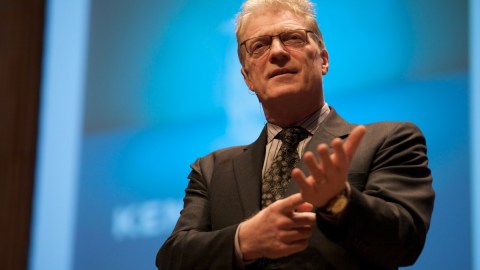Remembering Sir Ken Robinson, the educationalist who changed thinking on schools

- Robinson was a world-renowned educationalist who promoted creativity and more diverse and individualized curricula.
- Robinson’s 2006 TED Talk “Do Schools Kill Creativity?” remains the organization’s most popular presentation.
- He also authored five books and advised numerous organizations around the world.
Do schools kill creativity?
That was the central question of a wildly popular TED Talk given by Sir Ken Robinson, the world-renowned educationalist who argued for more holistic, diverse, and individualized schooling throughout his four-decade career. Robinson died of cancer on August 21 at age 70.
To those outside of education, Robinson is perhaps best known for that 2006 TED Talk, which remains the most popular TED video to date. In his presentation, Robinson argued that people don’t “grow into creativity,” but rather “we get educated out of it” by schools.
Robinson said the world’s education systems are built upon a hierarchy that places mathematics and languages on top, and arts on bottom. This results in schools that are great at producing university professors. But dancers, painters and comedians? Not so much.
“And I like university professors, but, you know, we shouldn’t hold them up as the high-water mark of all human achievement,” said Robinson, who worked as a professor at Warwick University from 1989 to 2001.
The Path to Discovering Your Talents and Passions, with Sir Ken Robinson | Big Think Mentoryoutu.be
The stifling nature of modern education may also contribute to what Robinson called the “crisis in our human resources.” Robinson proposed that one of the reasons so many modern people feel disengaged, depressed, and anxious is because they’re not pursuing goals or activities that put them in their element.
If schools prioritize certain pursuits over others, some people may never discover what their element is. In 2013, Robinson told Big Think:
“You can spend your whole life completely oblivious to some talent you may have because the opportunity never showed up for you to discover your resolve to develop it.”
Robinson wasn’t saying the world’s problems would disappear if everybody found their passion, but that it could help reduce psychological suffering.
“My long-term conviction has always been that we all have deep talents, and the potential for engagement, and we should explore it.”
Do schools kill creativity? | Sir Ken Robinsonwww.youtube.com
One force that could make it harder for people to find their element is the modern education system’s tendency to stigmatize mistakes. That’s a problem, Robinson argued, because if you can’t accept being wrong, original thinking becomes virtually impossible.
As such, Robinson argued we should move away from a standardized educational system that mines “our minds in the way that we strip-mine the Earth for a particular commodity,” and toward one that encourages each individual’s natural strengths and interests. In other words, schools are best framed as organic systems, not mechanical ones.
In his speeches and books, which include “The Element,” “Out of Our Minds,” “Creative Schools” and “You, Your Child, and School“, Robinson promoted several key ideas on education:
- Create a more diverse curriculum that focuses on individualization.
- Teach kids in creative ways that encourage curiosity.
- Find unique ways to awaken creativity within each student.
After growing up in a poor neighborhood in Liverpool, Robinson earned a Bachelor of Education degree at Bretton Hall College, which he said specialized in the performing arts, the humanities, and education. Robinson went on to chair Artswork, the UK’s national youth arts development agency; become an advisor to multiple international arts and education organizations; and be knighted in 2003 for his service to the arts.
In a 2018 interview with Top Hat, Robinson said:
“I don’t claim to have originated all the ideas and principles I promote. People have been arguing for them from ancient days. From the beginnings of mass education in the 18th and 19th centuries, there have been passionate advocates and practitioners of more holistic, humanitarian, progressive forms of education, which take account of the complex creatures we are and of the conditions in which we do best. I’m one of many who’ve taken up that torch. I continue to wave it because the need to act on these principles is becoming more urgent, not less. The nature of education is not an academic debate for me. We’re dealing with people’s lives and it’s vital to get this right.”





